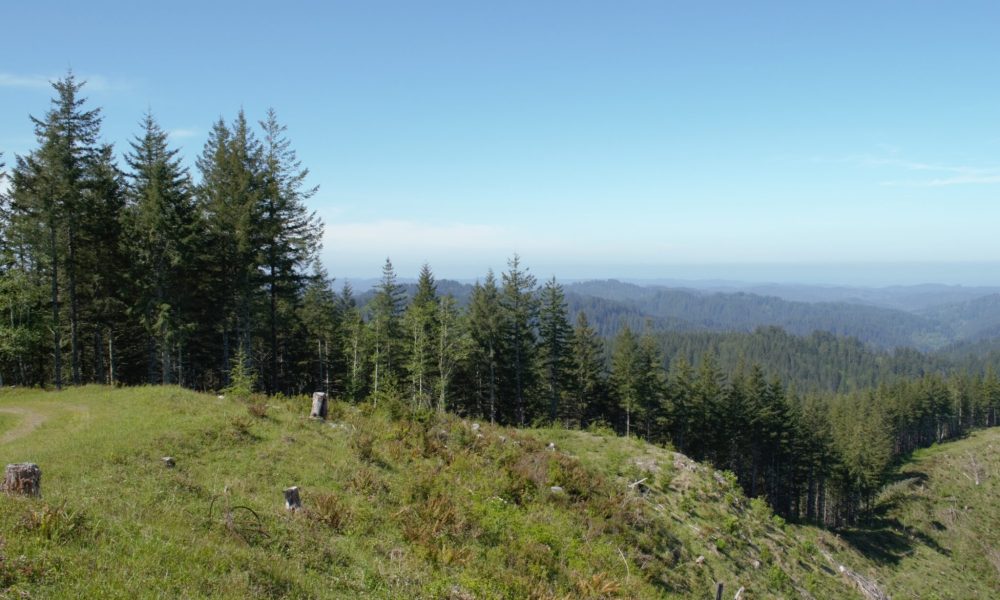A state forest with some of the last and largest swathes of old-growth trees in the Oregon Coast Range will no longer be logged to help pay for the public schools.
A vote from the State Land Board made the decision official Wednesday, following Legislative approval in February. The Elliott State Forest, now the Elliott State Research Forest, will be overseen by a new government agency in partnership with Oregon State University. It will be studied for long-term management and habitat and conservation practices. Some private logging will still be allowed.
The State Land Board includes Gov. Kate Brown, Secretary of State Shemia Fagan and State Treasurer Tobias Read. Brown also appointed a nine-person board to help with the creation of the agency that will oversee the forest. That agency will be called the Elliott State Research Forest Authority. It includes scientists and representatives from several tribes, conservation organizations and from the logging industry.
The 91,000-acre forest near Coos Bay has been logged since the early 1900s to provide revenue for the state’s Common School Fund, according to the Oregon Department of State Lands.
The fund takes in millions of dollars a year from timber harvests and mineral extraction on state public lands to fund schools. In 2022, those lands provided $64.2 million in revenue for the fund.
“The Elliott was continually caught between the financial obligation of the forest to support public schools and the forest’s potential to provide benefits beyond harvest revenue,” the land board said in a news release.
The state will make up the loss of education revenue by paying the appraised value of the forest, $221 million, to the school fund. The land board approved $100 million in bonds in 2018 to be paid to the fund, and the remaining $121 million will come from the state’s general fund.
“This is a day to celebrate the creation of the largest research forest in North America,” Read said in the news release.
Elliott State Forest is Oregon’s first state forest, established in 1930. In the last few decades, major losses in the forest’s old growth trees due to logging raised alarms among environmentalists.
In 2017, Read and former Secretary of State Dennis Richardson voted to sell the forest to a private timber company. Only Brown voted against it. The state was struggling to manage the forest for logging revenue while meeting environmental standards and legal obligations to protect imperiled animal habitat. Each year, the forest was supplying less money to the school fund.
But a public information campaign led by environmentalists was ultimately effective. Three months after it had voted to sell, the board reversed its decision.
Today, only 41,000 acres of old-growth trees remain, according to the nonprofit environmental group Oregon Wild. The forest provides critical habitat for threatened species such as the marbled murrelet and the northern spotted owl. Streams in the Elliot State Forest are where nearly one-quarter of Oregon Coast coho salmon originate.
Oregon Capital Chronicle is part of States Newsroom, a network of news bureaus supported by grants and a coalition of donors as a 501c(3) public charity. Oregon Capital Chronicle maintains editorial independence. Contact Editor Lynne Terry for questions: [email protected]. Follow Oregon Capital Chronicle on Facebook and Twitter.
STORY TIP OR IDEA? Send an email to Salem Reporter’s news team: [email protected].

Alex Baumhardt has been a national radio producer focusing on education for American Public Media since 2017. She has reported from the Arctic to the Antarctic for national and international media, and from Minnesota and Oregon for The Washington Post. She previously worked in Iceland and Qatar and was a Fulbright scholar in Spain where she earned a master's degree in digital media. She's been a kayaking guide in Alaska, farmed on four continents and worked the night shift at several bakeries to support her reporting along the way.









